From a small town in Yunnan to pursuing further education in Macao, from studying hydroelectric power to venturing into the field of machine translation, from publishing in the anthology China New Poetry Rankings to presenting her AI-powered poetry translation system at top-tier international computational linguistics conferences—Wang Shanshan, a doctoral student at the University of Macau (UM), embodies the creative synergy between literature and science. Wang has produced more than one thousand poems and multiple research breakthroughs. As she programmes AI to capture poetic quality when translating poetry in order to bring the romance of poetry to another language, it is clear that literature and science, two seemingly unrelated disciplines, can actually merge in extraordinary ways. Perhaps, through Wang’s research, her dream of bringing undiscovered masterpieces in Chinese literature to the world stage might just become a reality.
Rising as an interdisciplinary poet
Last month, at a prestigious literary event in Beijing—the awards ceremony of the inaugural global Chinese poetry competition organised by China Media Group and other leading institutions—Wang, in her hanfu, stood out among the award recipients. Her set of poems, ‘The Ever Falling Rain’ (《雨未停》), triumphed over 68,000 entries around the globe and won a poetry award in the university category. Unlike the conventional image of a poet immersed solely in the arts, Wang is actually an interdisciplinary poet—she is a doctoral student in computer science in UM’s Faculty of Science and Technology. The poetry competition attracted 10,955 participants from 31 countries and regions, and Wang broke the stereotype of a poet by producing extraordinary literary work with a mixed background in the humanities and sciences.
Hailing from Yunnan, Wang is a rising star in the literary circle. She is a member of both the Yunnan Writers Association and the Poetry Institute of China, and has been named an ‘Outstanding Writer’ by the journal China Postgraduates. Her work has been published in leading literary journals such as Shikan (《詩刊》) and Xingxing (《星星》), included in anthologies such as China New Poetry Rankings, and honoured with accolades such as ‘Top Ten Rising Chinese-Language Poets in 2024’. Some of her poems have even been translated into English and Spanish, reaching audiences far beyond China’s borders.
In 2019, Wang left her hometown to pursue a master’s degree and later a doctoral degree at UM. Over the past six years in Macao, she has maintained her enthusiasm for writing poetry. Notably, Wang was referred to for the first time as a ‘Macao poet’ in a news article about her recent win of the poetry award. ‘This title feels like a recognition for my continuous work in the poetry field. I’m grateful to be able to maintain my identity as a poet in Macao, and I’ll keep writing for as long as I can,’ she says.
Conducting research on AI poetry translation under the guidance of two mentors
Wang’s academic journey began far from the world of poetry—she studied energy and power engineering at Kunming University of Science and Technology, specialising in hydroelectric power. Yet, driven by her passion for poetry, she changed her research focus at UM, shifting from engineering to computer science. She dedicated herself to interdisciplinary research on AI-powered poetry translation under the guidance of Associate Professor Wong Fai in the Faculty of Science and Technology, a pioneer in the field of machine translation in Macao.
‘I decided to shift my research focus to computer science at UM and I was determined to excel in my studies,’ says Wang. With this resolve, Wang combined her literary flair with cutting-edge research in natural language processing (NLP). UM’s Natural Language Processing & Portuguese-Chinese Machine Translation Laboratory (NLP²CT Lab) became her testing ground, where she applied deep learning techniques to poetry translation under the supervision of Prof Wong. Wang’s work resulted in an innovative machine translation method for poetry, alongside a new set of evaluation metrics specifically tailored for AI-powered poetry translation. This ground-breaking research was presented at the Machine Translation Summit (MT Summit) 2023, opening a new avenue for the field.
‘For the progress I’ve made, I have to thank Professor Yao Jingming in the Department of Portuguese—who is also known by his pen name Yao Feng—for his guidance,’ Wang says. During the development of her machine translation system, Prof Yao provided valuable guidance on literary theories. ‘He didn’t just teach me how to grasp the essence of a poem—more importantly, he instilled in me a spirit of grit and innovation.’
Interestingly, what Wang did not know at first was that Prof Yao was the very poet she had admired since secondary school. ‘During a meeting, I noticed a signed poetry collection on Prof Yao’s desk, and it dawned on me as if I had discovered a beautiful secret,’ she adds.
‘Prof Yao often says that the most difficult part of translating poetry is preserving its essence. And the need to take into account the cultural connotation in both the source and target texts has completely changed my understanding of poetry translation,’ says Wang. Under the mentorship of Prof Wong and Prof Yao, Wang has developed a unique research perspective in AI-powered poetry translation, and her latest research ‘What is the Best Way for ChatGPT to Translate Poetry?’ has been accepted for the Annual Meeting of the Association for Computational Linguistics (ACL) 2024, a top-tier computational linguistics conference. ‘The free verse of modern poetry poses a greater challenge to AI-powered translation system than traditional poetry with regulated verse, as it places higher demands on the ability to capture the poetic quality,’ Wang explains.
Creating literary work in times of struggles
When Wang first stepped into the NLP²CT Lab six years ago, the challenges ahead seemed insurmountable. Moving from energy and power engineering to computer science was like entering another universe—especially for Wang, who knew nothing about programming, not even the basic concepts. To her, the lines of code seemed like an alien language, but retreat was never an option. Night after night, she stayed in the library until closing time, then moved to the learning commons to continue her studies. ‘Having learned programming techniques, I have more confidence in solving other challenges ahead, as if nothing can beat me,’ she says with a smile.
When Wang is under great pressure, literature is her haven. ‘I often sit on a bench by the lake on the UM campus, watching the water and waiting for inspiration,’ she recalls. ‘It is said that the most powerful work is often created during difficult times, and my experience has proven this to be true.’ Wang’s most productive creative period has coincided with her immersion in the throes of research. During her time at UM, Wang has written 400 poems, 160 of which have been published in print and 43 of which directly or indirectly depict Macao. Unlike typical evocations of the city’s glamour, Wang’s verses capture its quiet pulse and reveal its unvarnished character.
When Wang recalls moments of inspiration, one memory stands out: ‘When I was a master’s student, I often studied in the library and was always the last to leave. On my long walk back to the dormitory, I would hear frogs croaking. I used to sit on a bench by the lake and write until two or three o’clock in the morning. I ended up writing a poem called ‘Frog Leaps’ (《青蛙跳》).’
Bridging the divide of language
‘Great literary works should transcend language barriers and be appreciated by readers around the world,’ Wang explains. Today, Wang continues her pioneering NLP research in the NLP²CT Lab, developing machine translation technologies capable of preserving the essence of poetry.
Reflecting on the global presence of Chinese literature, Wang makes a poignant observation: ‘China has produced only one Nobel laureate in literature, and this is the result of multiple factors. In particular, language remains the most immediate barrier between our literary treasures and international audiences. For Chinese works to truly reach the world, it is imperative to break down linguistic barriers through quality translation.’
This belief has led Wang to embark on an ambitious mission: to develop a free and open-access literary translation system. Her goal goes beyond technical innovation—it is a mission of cultural dissemination. ‘I want to create a translation system that genuinely captures the essence and poetic quality of poetry, giving undiscovered masterpieces a chance to shine globally,’ she says.
Chinese Text: Kelvin U, UM Reporters Li Yuwei and Qiu Zichen
Chinese Editor: Gigi Fan
Photo: UM Reporter Tong Yongming, with some provided by interviewee
English Translation: Winky Kuan
Source: My UM Issue 144
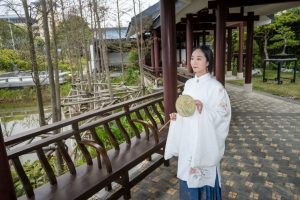
Wang Shanshan
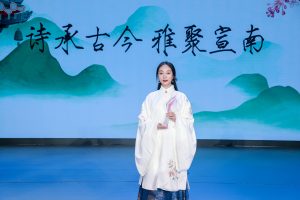
Wang wins a poetry award in the university category for her set of poems, ‘The Ever Falling Rain’ (《雨未停》)
出席全球華語詩歌徵集活動頒獎典禮_resized-300x122.jpg)
Wang (7th from right) attends the awards ceremony of the global Chinese poetry competition
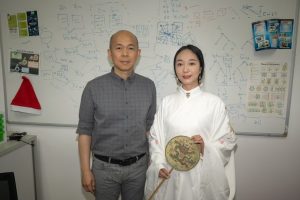
Wang and her supervisor Prof Wong Fai
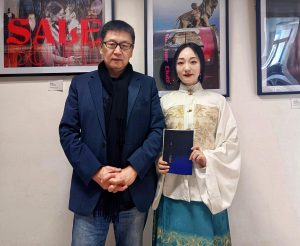
Wang and Prof Yao Jingming
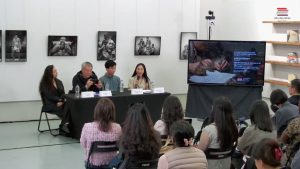
Wang shares her poems at the Macau Literary Festival
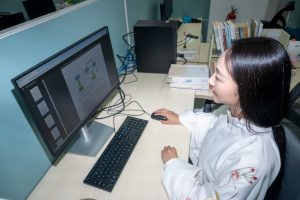
Wang conducts research in the NLP²CT Lab

Wang often sits on a bench by the lake on the UM campus to find inspiration for her work

